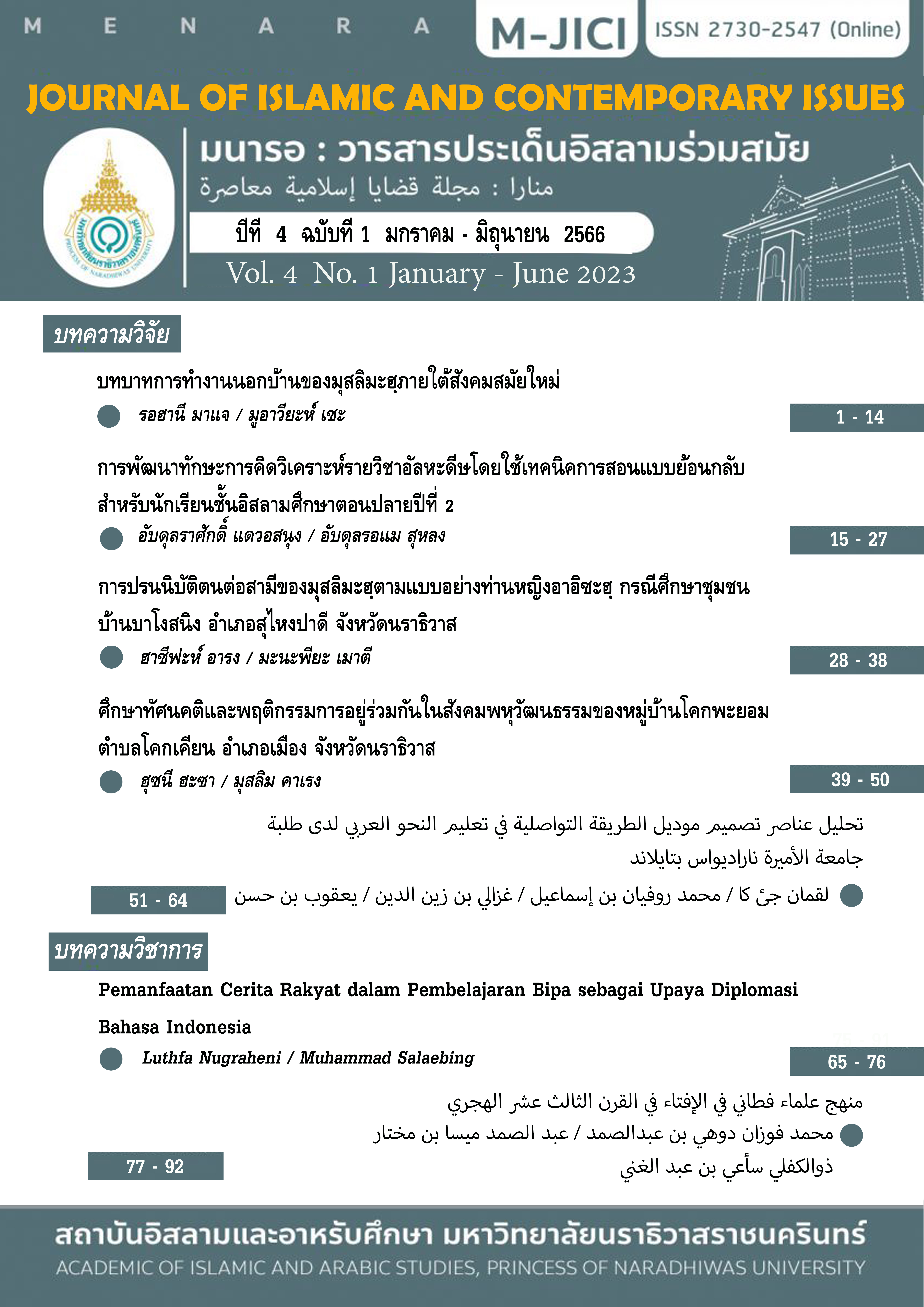The Role of Work Outside the Home of Muslimah in Modern Society
Keywords:
Working outside the home, Muslimah, Modern societyAbstract
This research is quantitative research aims to 1) study the understanding of the roles of Muslimah working outside the home according to Islamic law. 2) study the role of work outside the home of Muslimah in modern society: case study Tanyongmas Subdistrict, Rangae District, Narathiwat Province. By studying and researching information from the Qur'an, Hadith, books, textbooks, academic documents and related research and data were collected from a sample of 30 people selected by simple random sampling, and its number were compared based on Krejcie and Morgan table. The Cronbach's alpha coefficient was 0.76 and 0.80, and the IOC index was greater than 0.5. The data were analyzed by mean and standard deviation. The results were found that 1) Muslimah have knowledge and understanding about working outside the home according to Islamic law is good level accounted for 70 percent and 2) There are opinions about the role of Muslimah working outside the home under modern society in Tanyongmat Subdistrict, Rangae District, Narathiwat Province was found that most of them had a low level the mean (x̄) = 1.97 and the standard deviation (S.D.) = 1.2. The results of the analysis show that Islam does not prohibit Muslimah from working outside the home. There are various reasons that Muslimah have to work one of which is to help the husband support the family economy. The work of a Muslimah in society is not blocked. Muslimah can work like Muslim but within the limits and boundaries permitted by Islam. Working in Muslim society is not narrow but with more conciseness. This is to be good for Muslimah themselves. Muslimah have to learn more to prepare himself for this noble work. It requires mutual assistance and support from Muslims for the best results in their work.
References
จิรวุฒิ หลอมประโคน และประพล เปรมทองสุข. (2555). รูปแบบการดำเนินชีวิตของผู้หญิงวัยทำงานในเขตกรุงเทพมหานคร. คณะวิทยาการจัดการมหาวิทยาลัยศิลปากรวิทยาเขตสารสนเทศเพชรบุรี อำเภอชะอำจังหวัดเพชรบุ.
ชลิตา บัณฑุวงศ และคณะ. (2560). ชีวิตทางศาสนา กับสถานภาพและบทบาทของ “ผู้หญิงกำปง”
ในหมู่บ้านมลายูมุสลิมชายแดนใต้. ภาควิชาสังคมวิทยาและมานุษยวิทยา คณะสังคมศาสตร์.
ธานินทร์ ศิลป์จารุ. (2555). การวิจัยและวิเคราะห์ข้อมูลทางสถิติด้วย: SPSS. กรุงเทพฯ : บิสซิเนสอาร์แอนด์ดี
นพรัตน์ กอวัฒนากุล. (2559). กลยุทธ์ในการส่งเสริม บทบาทสตรีมุสลิม ต่อการพัฒนาสังคมในพื้นที่จังหวัดชายแดนภาคใต้. สงขลา : สำนักงานส่งเสริมและสนับสนุนวิชาการ 1.
ไพลิน ภู่จีนาพันธ์. (2560). บทบาทผู้หญิงในการสร้างความเสมิภาคทางการเมืองและอาสาสมัครพัฒนาสังคม. คณะรัฐศาสตร์และรัฐศาสนศาสตร์. มหาวิทยาลัยเชียงใหม่.
ภัทริยา คงธนะ. (2560). พื้นที่ความเชื่อในโลกสมัยใหม่ : ตัวตนใหม่ของผู้หญิงชนชั้นกลาง ที่ทำงานนอกบ้าน. วารสารมนุษยศาสตร์สังคมศาสตร์ปริทัศน์, 5(1): 51-84.
มุรีด ทิมะเสน. (ม.ป.ป). ตามหลักการอิสลาม ถูกต้อง หรือที่มุสลิมะฮฺออกมาทำงานนอกบ้าน. สืบค้นเมื่อ วันที่ 28 สิงหาคม 2565 จาก https://islamhouse.muslimthaipost.com/article/22756.
สมาคมนักเรียนเก่าอาหรับประเทศไทย. (ม.ป.ป). พระคัมภีร์อัลกุรอาน พร้อมความหมายภาษาไทย. ราชอาณาจักรซาอุดีอาราเบีย : ศูนย์กษัตริย์ฟาฮัดเพื่อการพิมพ์อัลกุรอาน.
สาลาม๊ะ หลงสะเตียะ. (2554). วิถีชวิตของผู้หญิงไทยมุสลิมที่ทำงานนอกบ้าน. ปัตตานี: มหาวิทยาลัยสงขลานครินทร์.
อับดุลกะรีม ไซดาน. (2525). ระบบสังคมในอิสลาม. แปลจากอุศูลุดดะอวะฮโดยอิสมาอีล อาลี
และมาลิก โยธาสมุทร. กรุงเทพฯ : สายสัมพันธ์.
อิมรอน มะกูดี. (ม.ป.ป). หน้าที่สตรีกับความสมดุลทางสังคมในอิสลาม. สืบค้นเมื่อ วันที่ 15 สิงหาคม 2565 จาก https://www.islammore.com/view/950.
อ้างอิงภาษาต่างประเทศ
Al-Bukhari, A. A. M. I. (1989). Al-Adabul Mufrad. Damsyik: Darul Basyair Islamiyah.
Muhammad Hafil. (2020). Wanita Bekerja dalam Pandangan Islam. สืบค้นเมื่อวันที่ 7 ตุลาคม 2565 จาก https://www.republika.co.id/berita/.
Rifan Aditya. (2021). Menurut Islam, Bolehkah Wanita Bekerja? Simak Penjelasan Buya Yahya. สืบค้นเมื่อวันที่ 26 ตุลาคม 2565. https://www.suara.com/news/2021/10/12/103104/menurut-islam-bolehkah-wanita-bekerja-simak-penjelasan-buya-yahya
Downloads
Published
How to Cite
Issue
Section
License
Copyright (c) 2023 MENARA : Journal of Islamic and Contemporary Issues

This work is licensed under a Creative Commons Attribution-NonCommercial-NoDerivatives 4.0 International License.



